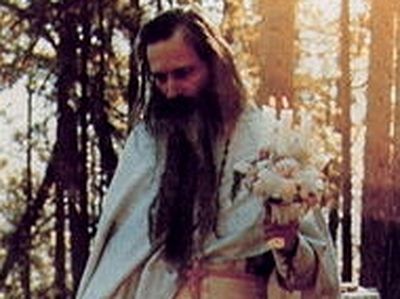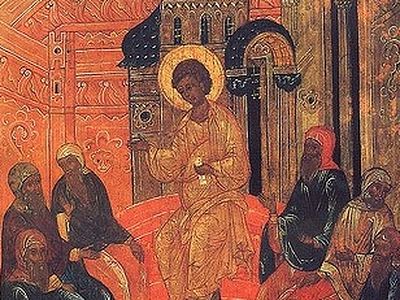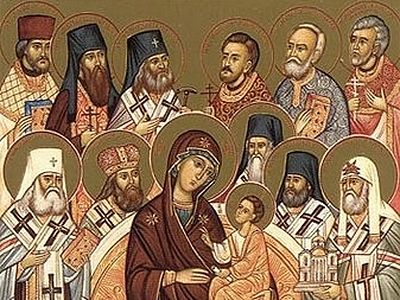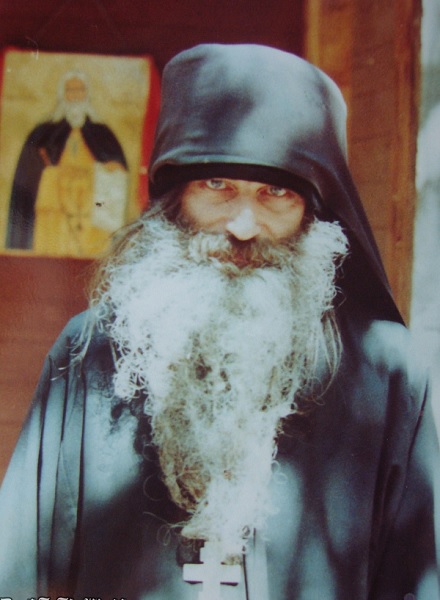
In May of 2012 a seminarian of St. Tikhon's (South Canaan, PA) traveled to the Entrance of the Theotokos Skete in Hayesville, OH in order to interview the chaplain Hieroschemamonk Ambrose Young and the abbess Mother Theadelphi as part of his research for his seminary thesis concerning Fr. Seraphim Rose and the “crucifixion” of his mind as Fr. Seraphim put it—meaning to willingly and obediently humble himself and submit his own sharp mind to the wisdom of the Church.
Both of them had personally known Fr. Seraphim, who reposed on September 2, 1982. Fr. Ambrose (Fr. Alexey before his monastic tonsure) initially met Fr. Seraphim in 1966 and became his spiritual child in 1970, lasting twelve years until Fr. Seraphim’s death. Much is said and written of Fr. Seraphim at coffee hours and on the internet, but to hear of him from those who knew and labored with him is enlightening and edifying. As is evident from this interview, Fr. Ambrose and Mother Theadelphi remember him as a man of profoundly deep faith who approached everyone with a balanced spirit of love and humility, and who sacrificed himself in labors for the salvation of others. Others who also knew him whom I have met remember him the same way.
Fr. Ambrose and Mother Theadelphi are two of our living links to the person of Fr. Seraphim and we ask for your prayers on their behalves.
Comments by Fr. Ambrose are introduced simply by a “—” and those by Mother Theadelphi by “—(MT).” Also present was another seminarian, Fr. Milan Medakovic who currently serves as the chaplain of the Serbian Orthodox Monastery Marcha in Richfield, OH. His comments are introduced by “—(FM).”
To begin the interview the seminarian read to them his thesis abstract which spoke of the crucifixion of Fr. Seraphim’s mind as seen in his life and writings, including The Soul After Death; Orthodoxy and the Religion of the Future; and Genesis, Creation and Early Man: The Orthodox Christian Vision:
* * *
—I would suggest that you also take a close look at the introductions that he wrote for some of the books he translated like The Northern Thebaid and Vita Patrum because those introductions contain additional material that you don’t find in the other books. Those introductions very much reflect his worldview.
—(MT): The willingness to crucify his own rational mind, and humble his mind before the Mind of the Church is really, I think, one of the most essential aspects of his example for us in the spiritual life now, because we see so little of that in the seminaries and in the life of the Church as a whole right now.
—And his view that he communicated very clearly to me was that what American Orthodoxy needs is not people with degrees, although there’s nothing wrong with degrees—but that’s not what’s needed. What he said is needed is a suffering heart and a sensitive heart. And as Mother was just saying, being able to submit to the Mind of the Church for the last two thousand years—this is not what goes on in American Orthodoxy. Everybody is very full of themselves and everybody knows just exactly what’s supposed to happen.

—Yes, they were very helpful for me.
—They were very helpful for me [laughs]. So, for example, he would say to me in the early days, “Find yourself a nice old-world batushka[1]—not somebody loaded with degrees; it doesn't even matter whether he speaks English. Watch him, listen to him, move the way he moves, cross yourself the way he crosses himself, watch the way he hears confessions watch the way he serves—you’ll learn far more from that than you will from the books.” This, of course, is not a popular idea in America, because today everything is about degrees, and books, and being learned and so forth.
And so I think that what happened was that in the person of Fr. Seraphim, who was very much that kind of old-world tradition transplanted to America, a number of people who are very well known in the Orthodox world then, and now, who disliked very much that old-world view, decided to fight it in any way, shape, or form that they could, and tried to discredit it if they could. And sometimes that was a personal attack on Fr. Seraphim; sometimes it was just an attack on the ideas. But in one sense it was good, because it made for a very clear line of demarcation for those of us Orthodox who share the old-world mentality and prefer that—without having to be Russians or Greeks, by the way. It has nothing to do with being an ethnic. It has to do with the worldview and the heart. It made it possible for us to see exactly what our sources of nourishment are, but not to set ourselves up to being superior to what I would call loosely the modernists in Orthodoxy in this country—those who really were more academics than they were Orthodox.
—One of the things that’s really attracted me about him is that I’ve always done well in school, but becoming Orthodox I realized that that could be a problem for me. But he was so brilliant, but was able to, as we’ve said, crucify his mind, and that was a huge attraction for me.
—Yes, well one time I was asking him about something, and I was a relatively new convert, so I was trying to understand from what I realize now was a purely kind of proud, academic point of view. I was trying to understand why the Fathers said that at one service you have to say “Lord have mercy” forty times, and at another service thirty times. And he listened to me and he said that the Fathers do have an answer for this, but “you’re coming from the wrong place asking this question, altogether. What you’re telling me, what you're saying by your words is that if you understand it, you’ll accept it.” He said you can’t do that in Orthodoxy. You have to accept it, period. And then the understanding comes later on. So he said he accepted absolutely everything, without question. It didn’t matter what the miracle was or who the saint was—he didn’t question any of it, he accepted it, and because of that it utterly transformed him. It was grace. There’s grace in those old peasant ways. And I'm sure you’ve read his introduction to St. John’s commentary on the Theotokos.
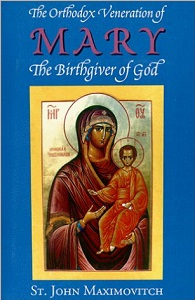
—So, you know that in that introduction he talks about the faith being passed on from one generation to another as a living tradition. He said, don’t let anyone ever take your books away from you, but don’t forget it’s a living tradition. In that introduction he talks about being at the Convent of the Vladimir Mother of God in San Francisco, and the old abbess, Mother Ariadna, whom I and Mother Theadelphi both knew (she’s gone now), was giving a sermon about the Dormition. Fr. Seraphim talking about himself as the young man who was there, who at that moment received that living tradition.[2] And he said that from then on he never questioned any of it. He said that otherwise you just end up with your mind all tied up in knots and all kinds of things.
—(MT): You’re always judging [if you do that].
—And you have to evaluate everything. That’s what our modern educational system tells us we have to do. So, he said you just accept it and live it. And that means first repenting, and then secondly humble obedience. Then if God wants more He’ll give it to you, or draw out of you or whatever needs to be. And if not, that’s okay too. So, he had no goal, he had no ambition. He had absolutely no ambition.
—I’ve seen him at times accused of mistranslating and misinterpreting, sometimes even purposefully, to make his points, but you’re saying he had no ambition to put forth his own ideas…
—No. In fact, I’m glad you raised that because something that is little known is that when the Holy Transfiguration Monastery in Boston was translating St. Isaac the Syrian’s The Ascetical Homilies, the monk contacted Fr. Seraphim and was asking him some questions about the differences between the translation that had been made in Russian by Optina with Ivan Kireyevsky (who was assigned to me by Fr. Seraphim for my thesis) and what he knew in Syrian would be the correct translation. Fr. Seraphim wrote back to him; he shared this correspondence with me, and he said to the monk that he was producing an academically correct translation, but it wasn’t a living translation. He said that the Optina Elders would, in their translations, get together once or twice a week to discuss various difficult passages, and they would discuss what various terms meant in their experience. Keep in mind that these were Spirit-filled elders, these were not academics. They didn’t have degrees. Everything was their own experience. These were men who were deified. And so they would come up with a translation that wasn’t perhaps academically right but was spiritually right. He explained this to this monk in Boston, and the monk wrote back and said, well, “This is all Old Believer-ism … these errors have crept in and we’re going to set the record straight now.” That was the end of the correspondence. So, again, that was Fr. Seraphim trying to gently point this man towards a living tradition based upon actual experience, from which there was great fruit, as opposed to a purely academic approach. The academic has its place of course, but it can’t ever take the place of the living tradition.
—Speaking of Holy Transfiguration Monastery—I converted because I became convinced that Orthodoxy was the Truth, but then I found out about these [Greek] Old Calendarists who say they’ve got a little more truth.[3]
—Yeah, you didn’t know that before, did you? [laughs]
—No! But then I read the collection of letters from Fr. Seraphim that you published,[4] and I saw how he handled the whole ordeal with the Boston monastery, and that was really what caused me to get over any interest in the [Greek] Old Calendarists. And it was really just cold logic. It was all a head thing.
—It’s a huge temptation in Orthodox today. Fortunately, a lot of lay people in the pew don’t know about these things, or they know very little about them, but the people who are doing research and reading and going online can find all this very easily. And all of a sudden they plant a seed of doubt about what you’re doing and where you are.
—You said he didn’t have ambition to put forth his own teachings. But would you say he was above theological error?
—Oh I wouldn’t say that. He wouldn’t say that.
—Well I’m sure he wouldn’t say that!
—But I certainly wouldn’t say that.
—Okay.
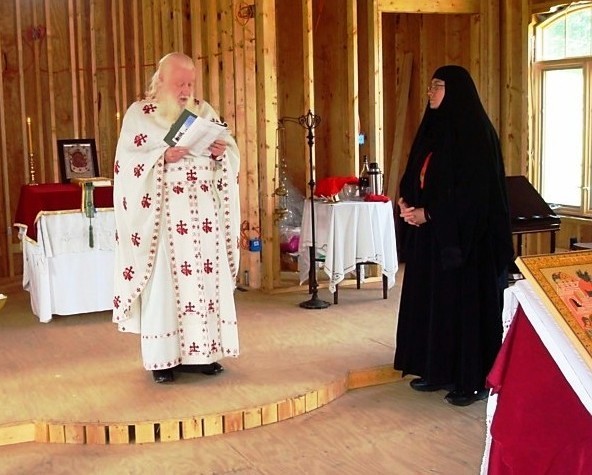 Fr. Ambrose and Mother Theadlephi at the Entrance of the Theotokos Skete
Fr. Ambrose and Mother Theadlephi at the Entrance of the Theotokos Skete
—I would say this: he was very soundly in the Russian tradition—the old Russian tradition. Not the Paris Russian tradition which is later and very innovative, but the pre-revolutionary Russian tradition. Not even necessarily the Russian tradition that came into the diaspora at the time of the exile, but the Russian tradition that was brought out by people who at that time were still alive: St. John (Maximovitch), Bishop Nektary (Kontsevitch)—and you know his connection with the Optina elders—and many others, all of whom had known real spiritual giants in the old world before the revolution, who were not necessarily ecclesiastical figures. They weren’t the movers and the shakers, but they were the real thing in the Russian Church. That generation came out and Fr. Seraphim happened to come into the Church just when those people were in their last years, and by God’s grace I met a few of them myself, though I didn’t speak Russian and so couldn’t benefit from it the way Fr. Seraphim could.
But in terms of translation there were Russians, such as Archbishop Anthony of San Francisco and others, who told me that Fr. Seraphim’s Russian was so perfect that even the emigres couldn’t tell he wasn’t one of them, and therefore when he was translating something he knew what he was translating, and if there was something that deviated in some way from what a Harvard scholar thought it should be, there was a reason for it.
—(MT): He also himself strived and urged others to strive to subdue subjective individual opinions, because it’s unhealthy for spiritual life. He would often remind everyone that you don’t even have to say that such and such a thing is good just because you like it—that’s no better than saying it’s bad because you don’t like it. Having opinions is already egotistical. So he strove after that in his own life, even in matters of food, for example. The Synod of Bishops asked him sometimes if he would research a controversial subject.
—He would never have done it on his own because he had no ambition. He wasn’t trying to be a teacher in the Church, wasn’t trying to be somebody. Many people who didn’t know him don’t realize this because he did become a teacher in the Church; but it wasn’t something he sought.
—(MT): And those who inveigh against the toll houses for example—a decree had been issued by the Russian Synod in Fr. Seraphim’s lifetime that those who reject and speak against this are in error and that this is the teaching of the Church as found in the divine services and in the writings of the Fathers.
—You can find it in the prayer to the guardian angel in the prayer book. It’s everywhere …
—Both of us just did papers on this. Fr. Milan wrote specifically on the toll houses and I wrote on the intermediate state of souls, and we know it’s still controversial.
—It’s controversial but it’s everywhere. Just because you don’t find the term “toll house” that doesn’t mean the teaching isn’t there. It’s just a prelest is what it is—a prelest, a plani,[5] a delusion to deny this.
—(FM): When I wrote this I asked my bishop[6] what his opinion about it was, and he said “What makes people think they’re going to be attacked by demons in this life but it won’t happen when the soul leaves the body?”
—A great point.
—(MT): In fact, Lev Puhalo and his antipathy on this subject was specifically disciplined by the Russian Synod years ago, yet he still continues to foster this point, and it’s a kind of obsession.[7]
—I remember very well that the Synod said we don’t want any more controversy about this and there’s to be no more writing, lecturing, arguing about this. Fr. Seraphim had already finished his book but Lev Puhalo kept right on going and continues to this day.
—He puts out many videos on YouTube and it seems like every third or fourth one still talks about the toll houses.
—Either that or Blessed Augustine. I believe that people like St. John Maximovitch, Father Seraphim of Platina and Blessed Augustine are almost litmus tests for Orthodoxy today in terms of people who are in touch with the genuine thing. We’re in touch with the genuine thing but I’m still a terrible sinner. People in the old world don’t have a problem with any of this. St. John was regarded as a universal saint, by the Serbian Church in fact, long before ROCOR did. ROCOR in fact had to be dragged kicking and screaming to canonize him because of who the Metropolitan was at the time. And Blessed Augustine is another one. I just read something online not long ago by a present-day bishop who was talking about the issue of Augustine, and he does make reference to Fr. Seraphim, but he quotes from different critics of Augustine who are, of course, Americans, and he says their comments fly in the face of a whole tradition in the Church, both Russian and Greek. And so this comes back to the point that Mother made: we have to be obedient to the Church, and if we don’t quite understand something it doesn’t mean it’s wrong—it means we don’t understand. It’s us that don’t understand. The Church is guided by the Spirit.
And this whole thing about opinions—Fr. Seraphim carried this to what is really (I thought then and I still think now) an amazing degree. I remember once I was talking with him in the forest and I asked him “What’s your favorite icon of the mother of God?” Everyone has a favorite icon of the mother of God, right? And he thought for a long moment and said, “Well I don’t have one,” and I said “But you must have one, everybody has one. You have a great devotion for the Mother of God,” and he thought again and said “Don’t you understand? It’s the whole thing!” So even there he didn’t have an opinion—as far as he was concerned it’s the whole thing. The Church is this vast, deep mystery that people play at. They play, they don’t pray, and then they hold themselves up as experts and don’t accept their place in the continuum, and the Spirit may choose to make them known or not. It really doesn’t matter one way or the other as long as you’re saved.
I was his driver on several occasions. He was going somewhere to give a lecture and I was behind him after we got out of the car, and he looked back and said, “This really isn’t for me, but it’s what God sent,” and he didn’t need to say anything more. That was it. And it wasn’t for him. He was an extremely shy person. Anyone who knew him knew he was the gentlest, shyest man. He wasn’t neurotic or anything like that. He could be stern when it was necessary with his spiritual children and the monastics, but I saw almost no ego. Fr. Damascene says about him that this was a man who had died to himself—he had crucified himself. And you know the story about the fake ice cream[8]—and it was true—he didn’t notice those things anymore. He had died to them.
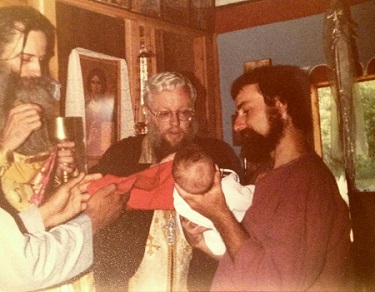 Fr. Seraphim with Fr. Alexey
Fr. Seraphim with Fr. Alexey
I was asked to give a lecture about Fr. Seraphim some years ago at an annual conference for the Evangelical Orthodox Church. It was held in Seattle that year. Little did I know I was actually going into a nest of vipers, because although those who invited me really wanted to hear this and were very devoted to Fr. Seraphim and Archbishop John, this was by no means the majority opinion there. In my lecture we talked about the things we‘ve been talking about here, and after my lecture one priest stood up, spitting with rage, and said “This teaching that we have to be in contact with the generation immediately before—I reject this and so does Metropolitan Philip. We stand in the tradition of Athanasius and the fifth century fathers,” and he went on like this for half an hour.
—That’s very strange.
—And I thought “Wow, there is some real antipathy here to this very traditional approach to authority in the Church,” because they had come to Orthdoxoy by books, so that was really their own authority and they had never made it across the bridge into the organic mind of the Church.
—In respect to submitting to authority and not having opinions (and I see you have elder Ephraim’s book), this idea leads people to think of cults and gurus; and some people say that Fr. Seraphim made himself out to be a guru.
—Oh, pfff! [laughs] … Elder Ephraim doesn’t either.
—(MT): Fr. Seraphim just laughed, and even St. John refused to allow anyone to act as though he was a guru.
—Fr. Seraphim didn’t even like it if you called him your spiritual father. He would say “Who am I? I’m nothing. I’m just your older brother.”
—(MT): In Greece Fr. Ephraim is one of many spiritual fathers equally respectable, and a lot of the things that he says I believe are misrepresented and misinterpreted or misapplied by well-intentioned followers, but he suffers in silence for those things. And some of it is the immaturity of the spiritual life here in America. Either we want to be completely autonomous and we‘re never going to ask anybody for any advice, or we just want somebody to fix us with no effort on our part.
—Fr. Seraphim wrote about this kind of immaturity in the Church in his time.
—(MT): We have priests in the Church, even married priests who want the members of his parish to get a blessing from them to buy an automobile or go on vacation or whatever.
—That’s cult stuff.
—(MT): Yes this is unhealthy, but Fr. Seraphim never did things like that.
—No. In fact, he told me about when he and Fr. Herman were in San Francisco and had started the Orthodox Word and had the chance to buy a second-hand press. They went to Vladyka John to get a blessing to buy it, and St. John said “What do I know about second-hand presses? If it seems like a good deal then buy it. If it works then God blessed it and if it doesn’t work then He doesn’t bless it.” Fr. Seraphim said that if anybody is a genuine elder it was Vladyka John. He said that’s the model.
—So he crucified his mind, but I saw one blog in particular, which I recall said he was anti-intellectual and anti-reason, but I don’t think that’s correct.
—He was an extremely cultured intellectual who continued until the end of his life to read even non-religious books on important intellectual and scientific subjects and such.
—(MT): He and Fr. Herman were both very cultured people.
—Yes, he made sure the brotherhood listened to good classical music on feast days, talked to them about the composers, saying, “This is good music, and that isn’t good music,” and he routinely assigned to people who came to him for spiritual guidance to read Dickens’ David Copperfield. They wanted to be tutored in the Philokalia and he said, “No, let’s start with David Copperfield,” and they were scandalized by this. Kids today don’t even know what David Copperfield is. He would say, “And if you understand David Copperfield then you can read Brothers Karamazov.” He was by no means anti-intellectual at all, and was a very cultured, very refined man.
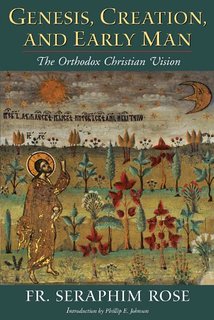
—Well that’s a whole other subject altogether of course, but if somebody concludes that you’re anti-intellectual just because you don’t believe in evolution, that already says something about science! Evolution is not a proven fact and therefore somebody is quite welcome not to believe in it.
—(MT): And as a matter of fact, he was quite interested in science and he read quite widely in it.
—Astronomy—he took the novices out at night with a telescope.
—(MT): And the natural sciences. He was extremely interested in a lot of different subjects. He was a very widely-read person.
—I think a lot of these comments just come from the ignorance of people who weren’t there, didn’t know him, and weren’t witnesses of him and how he thought and talked and acted, and his views on a lot of things. And they’re also coming from an assumption that science is always right; but science itself is always revising its own opinions every few years. And that’s okay. Fr. Seraphim felt the worst thing that had happened to this country was the educational system—not because he was anti-intellectual but because it wasn’t a liberal education anymore—it was something else; it has an agenda. And that’s even clearer now than when I was a school teacher. Things being taught to Greek Orthodox kids—I could never have dreamed that would happen.
—Both of my parents are public school teachers and are becoming increasingly disenchanted.
—It was still fairly okay when I was a teacher. I retired in ‘85 after teaching for twenty years, and then things really took off in terms of the new agendas that were coming into the curricula spreading across the country.
—A couple of us at seminary had a discussion about some pastoral issue and Fr. Seraphim came up, and someone said, “Yes, well he’s not known for being very pastoral, is he?”
—(MT): Oh, that’s not true.
—I think people look at what he wrote about but they don’t consider how he wrote about it. They see he wrote about creation or the toll houses or the end times and some controversial subjects and they associate that with fanaticism, and they think therefore he’s not pastoral.
—Well what do they mean by “pastoral,” too? What does that mean? It seems to me a lot of different things these days. I hear that term in reference to the gay lobby in the Orthodox Church too—“we need to be more pastoral.”
—(MT): He was extremely good with a grieving person, or a confused person.
—Or a repenting person.
—(MT): He could be very patient. Tell the story about fasting.
—It was my first Lent and I came to him for confession, and it was obvious I was pleased with myself, and I said “Well! I got through the fast without breaking it once.” He looked at me and said “Well, in that case it would be better if you had broken the fast because you’re very proud of it and it defeated the whole purpose”—very pastoral. He wasn’t interested in dead rules—he was interested in how you change your heart. And anything that leads to pride, even if it comes from the Church’s rule, would be bad for you.
—(FM): I think that today when someone says you’re not being pastoral it’s like as a parent—sometimes you have to say no to your children, but when you say no you’re being unpastoral, because to love them you have to let them do whatever they want.
 Fr. Seraphim in blessed respose
Fr. Seraphim in blessed respose
—That’s a good question! ... For me I would say he was the most believing man and had the deepest most profound faith of any man I have known before or since. For me that’s what stands out.
—(MT): Also I think what we all got from Platina was a real experience of the fact that to be an Orthodox Christian is such a treasure and such a wonder, that whatever you have to go through in this life to keep going with that is worth it. And he went through a lot.
—I agree with that. I think you would have to ask about the three main things! It’s very hard to pick one because he had great integrity. Everything was integrated. He was a whole man, and therefore he was a healed man. So it’s like saying, well, "What stands out about Jesus Christ?"
I think also that one of the difficulties is that the past history between the OCA and the Russian Church Abroad has colored some things with regards to Fr. Seraphim. A lot of that is water under the bridge—it doesn’t matter anymore—but it mattered then back in the ‘60s and the ‘70s because there were real issues involved. The biggest issue for the Russian Church Abroad was the "Metropolia" accepting its autocephaly from what is now known to have been a Soviet-controlled Church. The Russian Church Abroad never said they were without grace, never condemned anything—they just said we have to hold ourselves apart for the time being until this gets resolved. But somehow or other because of the fanatics in the Russian Church Abroad, like Boston[9] was at that time, this became a really knife-sharp, hard kind of thing, and I would say to people over and over again in the Russian Church Abroad, “Only go by the Synodal statements. It doesn’t matter what Fr. Panteleimon is saying in Boston. It doesn’t matter what Fr. Seraphim is saying in Platina. It doesn’t matter what bishop so-and-so is saying here. Just go by the Synodal statements because that’s the official position of the Russian Church Abroad.” And the official teaching of the Russian Church Abroad, which was public record, was always sorrowful, and there was never any “away with you” kind of attitude. I think that’s how many people in the OCA think they were being thought about.
And I have to tell you that except for the few fanatics, I never encountered that. In fact, quite the contrary. For instance, Vladyka Kyrill of San Francisco came from one of those families that was split by the schism. Half of his family went with the OCA and half went with the Russian Church Abroad. This was an incredible grief for him. But he always maintained very warm and loving relationships with the OCA side of his family. He went to their baptisms and weddings and funerals and so forth, and never said a bad word against them. I knew him before he was a priest. These are the still living people that know what was really going on back then, and it wasn’t all hardened, in your face kind of stuff.
Also on top of that, the Russian Church Abroad got a reputation, which was partly correct, for being very careful for preserving traditions. And the reason for that was that the Russian Church Abroad had decided at its first free council outside Russia in 1921 that they had to maintain all the customs and traditions, liturgical and otherwise, exactly as they had been before the revolution, in case it was lost in Russia. And so they made a point of preserving things with an exactitude that could sometimes have been a little over the top but wasn’t necessarily intended to be a judgment on anyone else, but it came to be seen as a judgment on everybody else. I was talking with Fr. Joseph[10] about this one time, and he said “We all knew, when I was going to St. Vladimir’s, that whatever the Russian Church Abroad does liturgically is right, but we couldn’t say it!” And I said it wasn’t a question of being right—they were preserving one Russian tradition. There were many Russian traditions. They preserved what was called the Imperial Moscow style which was done in the cathedrals of the Kremlin before the revolution. Jordanville, on the other hand, which was founded by monks from Pochaev, preserved the Pochaev customs and liturgical system. So it wasn’t a question of one being right, it was just a question of preserving it. And I think there was some understandable sadness over the fact that there were some in the OCA at that time who really were interested in playing around and experimenting with the services. That was going in the opposite extreme from the Russian Church Abroad. That was an error just as the Russian Church Abroad’s over-the-top position was also sometimes extreme.
So I think that now these things are all factors, but we’re a couple of generations beyond all that really, and people are living with myths and legends. They’re not living so much with the actual facts of who Fr. Seraphim was and how he lived and how he integrated with people. In his lifetime as a monk he had contact with just a couple of hundred people—that’s all. He didn’t have vast masses of people flocking to see him. There were people who came to see him, who went to some trouble to see him, but he wasn’t a celebrity even in the Russian Church Abroad. Nobody thought of him that way. But after he died his writings began to be circulated and picked up, especially overseas where people said “This is for us.”
I was in Russia in 1998, meeting with a group of pious Russians in St. Petersburg one evening, and they were asking me questions about Fr. Seraphim. They said, “You know, Father, Father Seraphim is really for us.” And I said “That’s funny—we always though he was for us Americans!” And then I realized: he’s a universal saint like St. John was. And St. John also has been made fun of—I hate to tell you what I’ve heard from some people about St. John and what they call him behind his back. It’s blasphemous. And yet here’s a great miracle worker, still working miracles. What they make of that I don’t know. Fr. Seraphim has worked miracles too. I think that the evil one is going to attack people who have that kind of universal appeal, especially for the generation of people like yourself. The evil one has to find some way to discredit them so that Fr. Seraphim doesn’t have a positive influence on anyone. So exploit the weakness of people, exploit the legends that have been handed down on both sides of the jurisdictional squabbles, exploit all of that, never get to the actual facts and fruits of the matter. So for that reason I’m very glad you came to talk to me, because I’m not the only witness but I’m one of them, and Mother too.
Fr. Damascene [Christensen] is really, I believe, the keeper of Fr. Seraphim’s legacy, because he, for a long period of time, especially when he was working on the biography, immersed himself in Fr. Seraphim’s writings like no one else has.[11] None of the other monks there knew Fr. Seraphim. Fr. Gerasim[12] was Fr. Seraphim’s last novice, so he’s in a unique position to speak about Fr. Seraphim. My witness is not that of a monastic or a priest but primarily that of a layman who was going to Fr. Seraphim for spiritual direction and asking about problems in life and in the Church and all those kinds of things. Mother’s witness is that of a monastic under Fr. Seraphim. Put us all together and you can sort of approximate the real Fr. Seraphim.
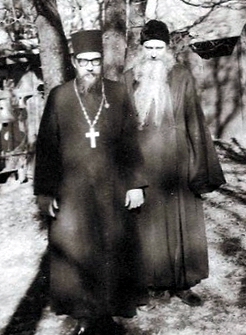 Fr. Seraphim with Fr. Herman, his monastic co-laborer
Fr. Seraphim with Fr. Herman, his monastic co-laborer
—We owe them a great deal.
—(MT): And they both gave blood of soul and body to help make that happen. And the people who say that Fr. Herman is lower than low are just as ignorant as the people who say that Elder Ephraim is a guru, for example. They’re equally ignorant and uninformed extremes. I think that a great deal more sensitivity and subtlety has to be applied to all these questions because the spiritual life is a real battle, on a real battlefield. Like in any battle there are real casualties. And sometimes a really good soldier who has fought honorably for a long time will suddenly fall in battle.
—And that’s what happened to Father Herman.
—(MT): I myself know very well where the difficulties developed. But I also know that in all my years since then I have been in a great many uninspiring and mediocre and modernist Orthodox situations, and if it hadn’t been for the ideals, and the really beautiful ideals that we were given at Platina in the old days, it wouldn’t have been worth it.
—If people like us had encountered Orthodoxy via what we have seen and experienced in parishes of different jurisdictions now, we wouldn’t have converted.
—(MT): No.
—Because it is not just smells and bells. There wouldn’t have been enough there. When I was approaching in the ‘60s’ it was the time of everything that was going on culturally, anti-culturally in this country, and I was part of that generation that was seeking for answers, although I was married and had started a career as a teacher. I was very disillusioned with the Catholic church in which I had been born and raised. I was seeking for answers. I was seeking for something that was real, because everything else seemed fake. And the counter-revolution was fake too. I was right there. I saw it. I witnessed it for myself. It was just as fake as everything else.
And so when I encountered Orthodoxy, which I encountered really in the form of St. John himself (I had the incredible blessing of having encountered him a few months before he died, and encountering that same year Fr. Seraphim while he was still a layman), my conversion to Orthodoxy wasn’t intellectual—it was very personal, because I saw in these people that which I wanted to be. And in these two men—one an American convert, still a layman, and St. John—this tiny little dwarflike man, hunched over—I saw … God. I don’t know how to explain it, but I saw that, “This is my destiny. These men represent something I will never find anywhere else.” And so then I stopped looking at other churches and jurisdictions because I knew this was it. And I knew that to acquire what they had I had to have the same faith they had. I’m still struggling to acquire that same faith. Of course later on I did all the intellectual reading and filled in all the blank spaces, and Fr. Seraphim was very helpful with that. But to encounter a couple of people who somehow in their very different ways and very different personalities incarnated something that was other-worldly just blew me away. I had never seen anything like it in the Catholic church or in the Protestant church.
—(MT): And you know that humans are very complicated. And the Fathers say that sin is very complicated also, and our natures are complicated. So you can’t just throw away an entire life’s work by focusing on one part of it. And so I really think at some point the record is going to have to be set straight about some of these things by honest speaking and honest dealing. And this is a growing concern now, because some people also say Fr. Seraphim couldn’t have been much because, “Look at what happened.” What happened at Platina was the rage of the evil one acting upon human weaknesses.
And I want to add one of the most important things that Fr. Seraphim and Fr. Herman endeavored to give everyone, which they got from Vladyka John and Bishop Nektary, which was that you have to own your Orthodox faith and take responsibility for it. And you have to not just be this little wimpy delicate hot house orchid that’s going to shrivel if there’s a strong breeze. So one of the things that they emphasized was that everyone, including our lay people, should learn how to do the services independently.
—And we did.
—(MT): Yes.
—And it wasn’t easy in those days when there wasn’t much in English!
—(MT): We were there for the twentieth anniversary of Fr. Seraphim’s repose, and we met up with other friends of ours who had been in the missions. We hadn’t seen some of them probably for fifteen years or more. They all got out their books and they knew how to do Vespers, they knew the tones and it was just like …
—Normal.
—(MT): … we were back there again.
—And the Russians who would encounter us were just in awe because they said, “Well we never learned any of this.” Part of it of course was that they didn’t know the Slavonic either. We didn’t have to learn the Slavonic. Fr. Seraphim wasn’t against us learning the Slavonic, but I asked him one time about learning Russian, and he said “No, no, don’t do that, because then you’ll hear all the gossip, so stay away.” And so I never did. I picked up phrases here and there but I never made an effort to learn it. I was at a point where I could serve in Slavonic but I certainly was never a master of Slavonic.
—You said that Fr. Seraphim is a universal saint like St. John—so you consider him a capital “S” saint?
—Oh I personally do! I have his icon in my icon corner. I pray to him every day. I sing the troparion to him. We don’t have his icon in the church of course because the Church has not glorified him, but I certainly do, yes. And I don’t know if you know this but one of the first miracles he worked after his death had to do with my wife.
—It’s in the biography I believe. Correct?
—It’s in the biography. And it was a real miracle, because she was only given a twenty percent chance to live five years and she lived. She was healed. She died fifteen years later but it wasn’t from that. She had been diagnosed with melanoma which had metastasized. That was just within a month or so after Fr. Seraphim died. I started anointing her with oil from his grave and praying to him, and it never showed up again. She went through all the tests every six months for the first five years, then once a year for the next five years and they said, “Mrs. Young, you’re a miracle, you’re not supposed to be here!” She said “I know I’m a miracle.”
So, I knew already there was something. Even when he was alive we didn’t treat him like he was an idol or something like that, but we knew there was something very special. It goes back to that wholeness I was talking to you about. He was a whole person, a whole man, and you don’t play games with someone like that. I think he was probably the closest we will ever get to seeing or knowing someone like St. John or St. John of Kronstadt who was also a whole person. I think there are just so few of us in the Church, much less outside of the Church. We’re just very broken and wounded in this culture and in this society. And so it was wonderful to see someone who was healed, not because he was sinless—he had his own temptations and struggles growing up—but because he just accepted everything, believed it and did it, and that’s what happened. He got a halo!
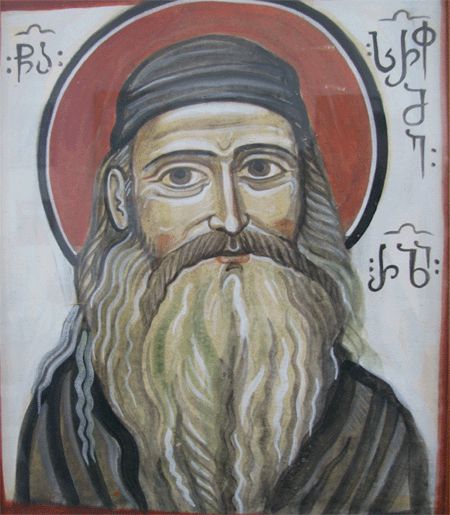 A Georgian icon of Fr. Seraphim
A Georgian icon of Fr. Seraphim
